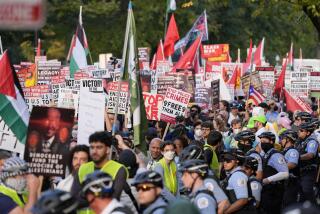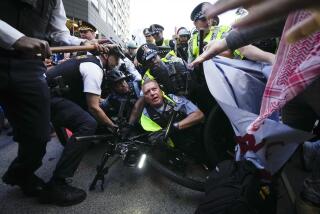A Look Back at Chicago Convention Riots, 25 Years Later : The Policeman : He maintains that the demonstrators were to blame for the rioting. When he sees former protesters as capitalists, he sees that as evidence that his side was right.
CHICAGO — For John Dineen, there never has been any doubt, then or now. When chaos came to this city in late August 25 years ago, he was on the side of might--and right.
He knows how it looked to a shocked nation. He heard the TV commentators and read the commission’s conclusion: police riot. But the career cop who spied on anti-war protesters during the turbulent 1968 Democratic National Convention has a very different outlook.
“In a way, it made me proud of the Police Department,” the 57-year-old detective said. “Police are semi-military organizations. We were given a job to do and we did it well. It’s not a job that a lot of other people would have wanted, but the job every night of being a police officer is not a job a lot of people would like.”
These days, John Dineen tracks mobsters. He’s back on the organized crime beat after his former partner defeated him this spring for the presidency of the Fraternal Order of Police, a job he held for 21 of his 34 years on the force.
In his years behind the badge, Dineen has ushered in the union’s first negotiated police contract, served two mayors named Richard Daley (father and son) and seen his share of clashes, notably that summer of ’68 when the Army veteran crossed paths with a rabble-rouser named Abbie Hoffman.
“He was a very sharp, well-educated guy,” Dineen said. “He was not the wacko he was made out to be and a lot of people thought he was.”
Protest leaders knew Dineen was a cop, but sniffing out secrets did not prove difficult.
“It ended up in a battle of egos between Jerry Rubin and Abbie Hoffman,” Dineen said with a slight smile. “They were telling on each other . . . what was planned for the next day, what type of incidents they hoped to create.”
“If you looked at them, they didn’t look like leaders,” he said. “That kind of made you nervous, that people would follow them.”
Follow they did, into the streets, into history.
On Aug. 28, 1968, millions of Americans inured to bloody battles in Vietnam on the evening news witnessed a closer-to-home skirmish: 18 minutes of live footage of the Chicago police clubbing anti-war protesters and others. Tear gas was lobbed, heads were cracked, pandemonium reigned.
Hundreds were injured, including cops, who said they were provoked by rocks, bottles and human excrement hurled at them. Dineen, in street clothes, was caught up in the crowd and a National Guardsman whacked him in the ribs with a rifle butt.
“Some of them caused riots,” he said of the demonstrators. “Some of them got their heads busted. Do I feel sorry for them? No. By the same token, they tried to break the policemen’s heads.”
Eight policemen were charged; all were acquitted. But to some, the Chicago cops and police brutality became inextricably linked, an image Dineen considers unfair.
“I don’t think Chicago had anything to be ashamed of,” he said, dismissing as political an independent post-convention riot report that blamed the cops for excessive force.
In many ways, Dineen, a burly, balding father of five, is the archetypal Chicago police officer who rose through the ranks a generation ago: Irish, military veteran, blunt bordering on gruff, more apt to suggest the few bad apples theory when cops are in trouble.
His politics haven’t changed much either. He still thinks America was right to be in Vietnam, though he didn’t like the results. And he finds vindication in anti-war activists toeing the Establishment line.
“You look at what happened to Abbie Hoffman and Jerry Rubin in their later life,” he said. “They joined the system they fought so hard against. It just shows who was right. I thought they finally saw the error of their ways and they wanted to live a better life and they realized if you can’t beat ‘em, you have to join ‘em.”
Dineen became union president in the ‘70s; it became a full-time job a decade later. After losing his reelection bid, he works in the Maxwell Street station, the fortress-like cop shop that was the backdrop for the TV series “Hill Street Blues.”
He says it’s tougher to be a cop now than in the riot-torn ‘60s: more violence, more drugs, more public demands.
But the police department is different too: better trained, more women and minorities and, Dineen says, even a smattering of cops who protested in 1968. Less than a fifth of Chicago’s cops were on the force in ’68.
Dineen says it will be no big deal if Chicago hosts a political convention in 1996. There is no galvanizing issue like the one that divided a political party and a nation and branded this city, he said.
“Society would approach dissent differently now,” he said. “Society as a whole is a lot more tolerant.”
And Dineen?
“I think so,” he said with a shrug. “You mellow with age.”
More to Read
Sign up for Essential California
The most important California stories and recommendations in your inbox every morning.
You may occasionally receive promotional content from the Los Angeles Times.










